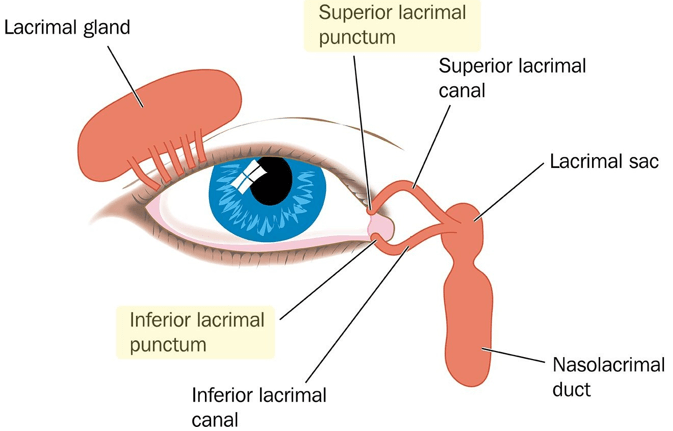A nurse is preparing to administer eye drops to a child.
Which of the following actions should the nurse take?
Apply pressure to the lacrimal punctum after administering the drops.
Position the child side-lying on the bed before administering the drops.
Wipe from the outer to the inner canthus after administering the drops.
Flush the eye with normal saline solution before administering the drops.
The Correct Answer is A
a. Apply pressure to the lacrimal punctum after administering the drops.
When administering eye drops to a child, the nurse should apply gentle pressure to the lacrimal punctum (the small opening in the inner corner of the eye) after administering the drops. This can help prevent the medication from draining into the tear duct and being absorbed into the bloodstream, which can reduce systemic side effects.

Nursing Test Bank
Naxlex Comprehensive Predictor Exams
Related Questions
Correct Answer is C,A,D,B
Explanation
Verify that the provider has certified the client's death: Before any postmortem care is initiated, it's crucial to confirm that the client has indeed passed away. This verification is typically done by a healthcare provider, such as a physician or nurse practitioner, who examines the client, checks for signs of life, and makes an official declaration of death.
Determine the family's preferences about care of the body: After the client's death has been certified, the healthcare team should communicate with the family or next of kin to inquire about their preferences regarding the care of the deceased. Families may have specific cultural, religious, or personal requests regarding postmortem care procedures, and it's essential to respect and accommodate these preferences whenever possible.
Remove all equipment and tubes from the client's body: This step involves the removal of any medical equipment, devices, or tubes that may have been in use during the client's medical care. This can include items such as intravenous (IV) lines, catheters, ventilator tubing, and monitoring equipment. Ensuring that all equipment is removed is not only a matter of dignity but also helps prepare the body for viewing by the family, if desired.
Apply identifying name tags onto the client .To maintain accurate identification and tracking of the deceased client, it's common practice to attach identifying name tags or labels to the body. These tags typically contain essential information, such as the client's name, medical record number, and date of birth. This step helps prevent any confusion or mix-up of identities during postmortem procedures and transport.
Correct Answer is D
Explanation
After a tonic-clonic seizure, the nurse should first check the child for any injuries, particularly in the oral cavity. This is because during a seizure, the child's tongue may have been biten, or there may be other oral injuries. Therefore, it is essential to check the oral cavity for any injury or bleeding.

Whether you are a student looking to ace your exams or a practicing nurse seeking to enhance your expertise , our nursing education contents will empower you with the confidence and competence to make a difference in the lives of patients and become a respected leader in the healthcare field.
Visit Naxlex, invest in your future and unlock endless possibilities with our unparalleled nursing education contents today
Report Wrong Answer on the Current Question
Do you disagree with the answer? If yes, what is your expected answer? Explain.
Kindly be descriptive with the issue you are facing.
